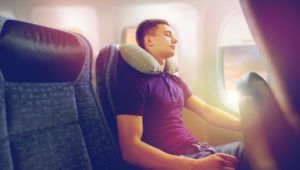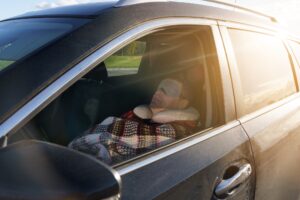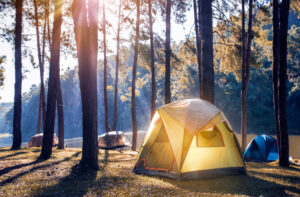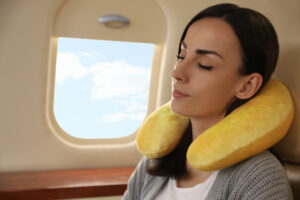Sleep in the Military
In the United States, 37% of people regularly don’t get their recommended minimum of seven hours of sleep per night. For military personnel, that number climbs to 76%. Service members have difficulty getting adequate sleep for a variety of reasons, including the stressful and at times dangerous nature of deployment and training, comorbid conditions like post-traumatic stress disorder (PTSD), jet lag from frequent travel, and broader military culture.
How Much Do Service Members Sleep?
On average, 60% of service members sleep fewer than six hours per night. Those who have been previously or are currently deployed sleep even less, at fewer than five hours per night. Either of these is significantly shorter than the recommended minimum of seven hours for adults.
Sleep During Deployment
During Operation Iraqi Freedom, the average U.S. Army soldier slept 5.8 hours per night, with short sleep more common among those who experienced combat. Naps were rare, and reported by only 16% of soldiers.
A reported 86% of Army service members deployed to Afghanistan slept fewer than seven hours per night, and half slept fewer than five. Around 15% of Air Force personnel slept less than 4.5 hours. Navy service members slept 5.9 hours on average, with 67% sleeping less than seven hours.
Sleep During Training
During training exercises, service members may sleep fewer than five hours per night. Typically, that five hours is split up into multiple episodes of sleep, usually lasting less than two hours each.
U.S. Military Academy cadets sleep fewer than five hours during the week and are woken up several times during the night for training. Even on the weekends, when they’re encouraged to sleep more, they still get fewer than seven hours. Those in Ranger School only get around three hours per night.
How Much Sleep Do Soldiers Need?
Soldiers need the same amount of sleep as everybody else, if not more, depending on the physicality of their mission. Adults need at least seven hours of sleep, and people with physically demanding lifestyles — like athletes and service members — may need more.
Studies indicate that when soldiers get fewer than four hours of sleep per night, it reduces their effectiveness in combat by 15% to 25%. Moreover, studies of Army Rangers show that their testosterone levels are lower after the sleep loss they endure during training, at a time when they need it most for muscle repair and recovery.
Getting good sleep is essential to a soldier’s day-to-day performance as well as their future mental and physical health.
Looking to improve your sleep? Try upgrading your mattress.
The Military’s Stance on Sleep
The Office of the Army Surgeon General recommends that soldiers sleep at least seven hours per night, although only a minimum of four hours is required during field training exercises. In preparation for times when sleep may be hard to achieve, such as during a combat mission or overnight operation, soldiers are recommended to get at least nine hours of sleep ahead of time.
While not a long-term solution to the impacts of chronic short sleep, “banking” sleep in this way may provide immediate, next-day effects which can improve soldiers’ effectiveness during a mission. Getting more sleep than usual (such as 10 hours) improves alertness and performance during a short period of sleep deprivation, and napping has been shown to lower heart rate and improve memory in athletes.
Due to the nature of military service, it’s difficult for many service members to sleep for seven hours, uninterrupted, so they end up taking naps when they can. Some may use the military sleep method, which popularized in the book Relax and Win: Championship Performance. This military sleep method was used by World War II soldiers to fall asleep within two minutes. Here’s how it works:
- Start by relaxing your entire face, including your foreheads, eyelids, jaw, and tongue.
- Drop your shoulders and then your hands, letting them fall to either side of your body.
- Inhale and exhale to relax your chest.
- Then, progressively relax your legs, starting with your thighs and then your calves, ankles, and feet.
- Clear your mind for ten seconds. You might visualize a relaxing scene, like watching the rolling waves at a beach, being in a dark room, or swinging in a hammock looking at clouds in the sky. When thoughts come up, don’t get frustrated; just let them come and go. If visualization doesn’t come easy, try repeating “don’t think” to yourself over and over.
- Once you have relaxed your body and cleared your mind, you should be able to fall asleep.
Regulated Nap Times
In more recent years, the military has increased its focus on changing the military culture around sleep by providing service members with education about how sleep works and offering tips for better sleep.
In 2020, the Army updated its FM 7-22 Holistic Health and Fitness manual by expanding its guidance on sleep and promoting better sleep hygiene (such as following a consistent sleep schedule, finding a restful sleep environment to sleep in, and adopting a bedtime routine). The manual recommends service members take short, daytime naps during the afternoon to help them reach seven or eight hours of sleep over a 24-hour period.
It also advises soldiers to avoid sleeping near vehicles or trucks, use mosquito nets to stave off insects, and carefully inspect their military sleeping bag and shoes for snakes, spiders, and ants before getting inside.
The Department of Defense recommends that when sleep deprivation is required for an operation, soldiers take “tactical naps” of 20 minutes, followed by caffeine. If they’re aware of a mission ahead of time, they should bank their sleep by sleeping extra hours beforehand. Leaders are supposed to provide quiet, restful sleep environments and enable those under their command to receive eight hours whenever possible.
Challenges Soldiers Face in Getting Adequate Rest
In many ways, the conditions of serving in the military make good sleep hard to come by.
Circadian Shifts
It’s worth noting that many service members join the military during adolescence, when the body experiences a circadian shift. Our circadian rhythms regulate our sleep-wake cycles. During adolescence, our circadian rhythms shift later, so we naturally feel tired later. We also need to sleep for about nine hours, which is one hour longer than what the average adult needs.
When teens join the military after high school, they’re still operating on this delayed circadian shift, even though they’ve now entered an environment where 4:30 a.m. wake times are normal, as is getting fewer than six hours of sleep. Short sleep becomes normalized, even though it leads to negative health and performance impacts.
When the sleep schedules of army trainees are shifted to better align with their natural circadian schedule, trainees report better sleep quality and mood, as well as improved marksmanship. Similarly, in a study of U.S. sailors, those who were moved to a more preferred watch schedule reported less daytime sleepiness, better mood, faster reaction times, and fewer errors.
Poor Sleep Environments
Due to the nature of their service, soldiers often have to grab sleep whenever they can get it, and must fall asleep quickly even in loud, uncomfortable environments. Even low levels of noise during sleep can trigger a stress response, alter sleep architecture, and lower sleep quality — leading to daytime sleepiness, mood changes, and poorer cognitive performance.
Depending on their mission or duty, soldiers may be exposed to additional factors that impair sleep. For instance, U.S. Navy sailors who work in a dark control room may have significantly different melatonin levels than those who work outdoors, due to the difference in light exposure. Without access to natural sunlight, those working on submarines suffer from irregular sleep-wake cycles. The noise of an engine room can also increase cortisol (stress) levels, disrupting sleep later on.
Military personnel are often subject to abnormal lighting that may disrupt circadian rhythms. Those working in 24-hour environments may be exposed to artificial light that reduces melatonin levels and sleep quality. If they wake up at night, they may have to walk a significant distance outside, in a brightly-lit area, to reach the latrines, further rousing their brains and making it harder to fall back asleep.
Overnight Shifts
Soldiers who work night shifts may suffer further circadian disruptions, since they are on duty at a time the body expects to be asleep. Night shift work can lower skeletomuscular strength, increase cardiovascular stress, and increase inflammation — all of which can increase a service member’s risk of injury.
Military combat missions are often prioritized for night, and it’s common for service members to coordinate with units located halfway across the world, leading to further sleep disruptions due to mid-night teleconferences.
Military Culture
While there is a growing awareness of the importance of sleep, military culture largely accepts sleep deprivation as a normal part of life on duty. A 2021 Department of Defense report found that military members feel that they can control how much sleep they need, and tend to view needing sleep as “weak.”
The Department of Defense also approves caffeine as an acceptable stimulant for service members, who are more likely to consume it in higher quantities during combat. Problematically, soldiers may begin to overuse caffeine, especially those who perform shift work. As a result, they may have a harder time falling asleep at night, which leads to more reliance on caffeine the following day to stay vigilant.
The Dangers of Sleep Deprivation for Military Service Members
Sleep deprivation describes how we feel when we miss out on sleep, be it on a short-term or long-term basis. It leads to symptoms like:
- Daytime drowsiness
- Impaired concentration and focus
- Decreased motivation
- Poor mood and irritability
- Longer reaction times
- Impaired judgment
Problematically, young people suffering from sleep deprivation are prone to underestimating how much it affects their performance, and often think they’re performing better than they are. Indeed, only 16% of soldiers believe their performance is affected by lack of sleep. This tendency — combined with symptoms like impaired cognitive performance, reaction time, and judgment — can threaten a soldier’s personal safety, the success of their mission, and national security.
Sleep deprivation can negatively impact a soldier’s ability to assess the threat level in a situation, coordinate with their squad, and engage optimally in combat activity. They may experience lapses in memory or attention, cause an accident, or get injured.
Beyond its immediate effects, sleep deprivation is also linked to chronic health conditions like PTSD, diabetes, dementia, and cardiovascular disease. Soldiers who regularly miss out on sleep are also more likely to report symptoms of depression, panic syndrome, suicide attempts, and tobacco and alcohol abuse.
Sleep Disorders and the Military
In the past 15 years, rates of insomnia among service members have increased 45-fold, and obstructive sleep apnea (OSA) has increased 30-fold. Army service members were the most likely to report these sleep disorders, and female service members were most likely to be underdiagnosed.
Insomnia
Insomnia describes an inability to fall or stay asleep. It’s considered chronic when symptoms last for more than one month. One study measured the prevalence of sleep disorders in active duty military personnel via polysomnogram, an overnight sleep study, and found one in four participants had insomnia.
Insomnia is linked to PTSD, depression, and mild traumatic brain injury (mTBI). Around 55% of service members with combat related head injuries have insomnia symptoms. It’s common for soldiers to experience insomnia at the beginning of a deployment, whether due to jet lag, an uncomfortable or different sleeping environment, the stress of leaving their loved ones, or anxiety over the deployment itself.
Obstructive Sleep Apnea (OSA)
Over half of active duty military personnel have OSA, a sleep-related breathing disorder that lowers sleep quality and causes snoring, gasping, or choking sounds during the night. Nearly one-third of active duty military personnel have insomnia as well as OSA.
In the civilian population, OSA is strongly associated with obesity, age, and low physical activity, but service members who develop OSA tend to be younger, have lower body weights, and be more physically fit.
Post-Traumatic Stress Disorder (PTSD)
PTSDaffects 11% to 30% of veterans. Short sleep is the strongest predictor of PTSD, with soldiers who sleep less being significantly more likely to develop PTSD.
Insomnia frequently co-occurs with PTSD. Nightmares are another common symptom. At least 90% of Vietnam veterans with PTSD also suffer from insomnia. Among Afghanistan and Iraq War veterans, 92% of those with PTSD also have insomnia, compared with 28% of those who don’t have PTSD.
For many military personnel, their sleep problems persist beyond their military service. When they return home, they face the challenge of unlearning the poor sleep hygiene they became used to, adopting new sleep habits, and realigning their circadian rhythms to a more normal sleep schedule. Moreover, they may be suffering from an injury or illness from combat that can disrupt sleep even further.
If you or a loved one are suffering from sleep problems or PTSD, consult a health professional.

Still have questions? Ask our community!
Join our Sleep Care Community — a trusted hub of sleep health professionals, product specialists, and people just like you. Whether you need expert sleep advice for your insomnia or you’re searching for the perfect mattress, we’ve got you covered. Get personalized guidance from the experts who know sleep best.
References
13 Sources
-
U.S. Naval Institute Staff. (2021, March 3). Pentagon Report on Sleep Deprivation and Military Readiness. USNI News.
https://news.usni.org/2021/03/03/pentagon-report-on-sleep-deprivation-and-military-readiness -
Consensus Conference Panel, Watson, N. F., Badr, M. S., Belenky, G., Bliwise, D. L., Buxton, O. M., Buysse, D., Dinges, D. F., Gangwisch, J., Grandner, M. A., Kushida, C., Malhotra, R. K., Martin, J. L., Patel, S. R., Quan, S. F., Tasali, E., Non-Participating Observers, Twery, M., Croft, J. B., Maher, E., … Heald, J. L. (2015). Recommended amount of sleep for a healthy adult: A joint consensus statement of the American Academy of Sleep Medicine and Sleep Research Society. Journal of Clinical Sleep Medicine, 11(6), 591–592.
https://pubmed.ncbi.nlm.nih.gov/25979105/ -
Good, C. H., Brager, A. J., Capaldi, V. F., & Mysliwiec, V. (2020). Sleep in the United States Military. Neuropsychopharmacology, 45(1), 176–191.
https://pubmed.ncbi.nlm.nih.gov/31185484/ -
Luxton, D. D., Greenburg, D., Ryan, J., Niven, A., Wheeler, G., & Mysliwiec, V. (2011). Prevalence and impact of short sleep duration in redeployed OIF soldiers. Sleep, 34(9), 1189–1195.
https://pubmed.ncbi.nlm.nih.gov/21886356/ -
Watson, A. M. (2017). Sleep and athletic performance. Current Sports Medicine Reports, 16(6), 413–418.
https://pubmed.ncbi.nlm.nih.gov/29135639/ -
Winter, L. B. (1981). Relax and Win: Championship Performance (1st ed.). Oak Tree Publications. Department of the Army. (2012, October 26). Holistic Health and Fitness. Army Publishing Directorate., Retrieved on May 25, 2021, from
-
Halperin, D. (2014). Environmental noise and sleep disturbances: A threat to health? Sleep Science, 7(4), 209–212
https://pubmed.ncbi.nlm.nih.gov/26483931/ -
Alhola, P., & Polo-Kantola, P. (2007). Sleep deprivation: Impact on cognitive performance. Neuropsychiatric disease and treatment, 3(5), 553–567.
https://pubmed.ncbi.nlm.nih.gov/19300585/ -
Bonnet, M. H., & Arand, D. L. (2003). Clinical effects of sleep fragmentation versus sleep deprivation. Sleep Medicine Reviews, 7(4), 297–310.
https://pubmed.ncbi.nlm.nih.gov/14505597/ -
Mysliwiec, V., McGraw, L., Pierce, R., Smith, P., Trapp, B., & Roth, B. J. (2013). Sleep disorders and associated medical comorbidities in active duty military personnel. Sleep, 36(2), 167–174.
https://pubmed.ncbi.nlm.nih.gov/23372263/ -
Moore, B. A., Tison, L. M., Palacios, J. G., Peterson, A. L., & Mysliwiec, V. (2021). Incidence of insomnia and obstructive sleep apnea in active duty United States military service members. Sleep, zsab024. Advance online publication.
https://pubmed.ncbi.nlm.nih.gov/33532830/ -
National Center for PTSD. (2018, September 24). How common is PTSD in veterans? U.S. Department of Veterans Affairs., Retrieved on May 25, 2021, from
https://www.ptsd.va.gov/understand/common/common_veterans.asp -
Gehrman, P. (2020, March 26). Sleep problems in veterans with PTSD. U.S. Department of Veterans Affairs., Retrieved on May 25, 2021, from
https://www.ptsd.va.gov/professional/treat/cooccurring/sleep_problems_vets.asp







